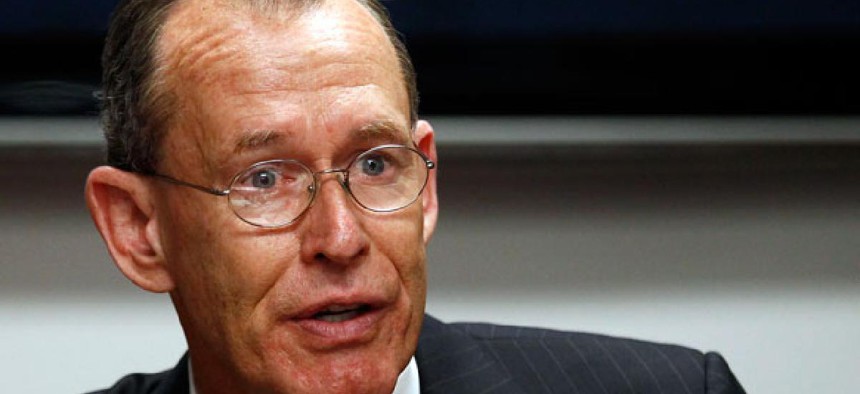
Lockheed Martin CEO Robert Stevens Kevin Lamarque/Newscom
Sequestration specter already is making its mark on contractors
Aerospace industry is experiencing a ‘chilling effect,’ Lockheed Martin chief tells lawmakers.
Neither the government nor the aerospace industry can afford to sit and wait for the sequestration required under budget law to kick in on Jan. 2, 2013, an industry chief said Wednesday. The mere threat of across-the-board spending cuts already has had a “chilling effect” on companies that are vital both to the economy and to U.S. national security, said Robert Stevens, chairman and chief executive officer of Lockheed Martin Corp.
Stevens told a Capitol Hill luncheon gathering sponsored by the Aerospace Industries Association that his industry has responded to the budget situation’s “huge disruption” by reducing overhead and cutting investments in training and research and development, as well as imposing “painful” reductions in force.
“We understand the need to address our nation’s fiscal challenges,” he said. “But the prospect of sequestration is another matter entirely,” given the $500 billion in reductions the Pentagon would absorb over 10 years, including $53 billion in fiscal 2013 alone. Such changes would be “divorced from any national strategy and from operational needs,” he said, resulting in “the smallest ground forces since 1940, the fewest ships since 1950, and the smallest Air Force in history.” The country needs a “strategy to preserve the industrial base, not dismantle it,” he added.
Lockheed Martin is part of the association’s ongoing “Second to None” campaign against defense and aerospace industry budget cuts. Near Stevens’ podium the group mounted a large digital clock, a version of which was recently up in New York City’s Times Square, noting the exact number of days, hours, minutes and seconds until the Jan. 2 sequestration. It warns that its industry will lose a million jobs if Congress makes drastic cuts in such areas as defense, the NextGen air traffic management system and the space program.
The association also released a report by Deloitte detailing the financial and economic impact the industry has on the nation, with state-by-state job numbers both direct and indirect. It noted that 19,150 aerospace jobs were eliminated in 2010 and 34,759 in 2011.
Stevens described his industry’s “critical contribution to the economic engine of America” -- $324 billion in sales in 2010, adding 2.3 percent to gross domestic product, and $89.6 billion in exports. He called it a “wellspring of innovation and creativity in technological advancement,” citing development of day-to-day essential products in air safety, weather forecasting and communications connectivity, along with weapons systems that “define a generation.”
But he said the modern industry is by necessity “smaller and leaner” and “fragile in the shadow of sequestration.” He said he “can’t begin to judge the impact of a bow wave of $53 billion" in fiscal 2013 on suppliers, partners and contractors, to whom companies are obligated to provide 60 to 90 days’ notice if workers are to lose jobs.
He expects many equity adjustment requests. “To ask us to react instantly in the year of execution would be massively complicated, and we have no real response,” he said. “It’s all yet to be determined.”
To avoid sequestration, Stevens said, Congress should consider three elements to address the nation’s $15 trillion debt: spending cuts in both defense and nondefense areas, an examination of tax policy, and entitlement reform.
Sen. Saxby Chambliss, R-Ga., co-chairman of the Senate Aerospace Caucus, also urged Congress to act soon. “If we think we’re going to wait until a lame-duck session, we’re kidding ourselves,” he told the group. He highlighted the industry’s importance both to national security and to a healthy export economy, noting he represents the Port of Savannah. “We need to make purchases by other countries easier, though we do need to get the most out of each defense dollar,” he said.
Sen. Patty Murray, D-Wash., the other leader of the caucus, praised Lockheed Martin as an important symbol of American corporate leadership, adding it is celebrating the 100th anniversary of the founding of its namesake companies. She stressed the need for the government to invest in the education and training of scientists, mathematicians and engineers. She asked the industry for support for a current amendment to reauthorize the Export-Import Bank of the United States, and implored aerospace companies to hire and train veterans.
NEXT STORY: Happiness and Productivity Go Hand-in-Hand







